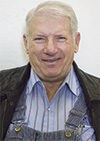Except for one fellow. He arrived with his saw sharp. He also had the correct tools to sharpen the chain on-site, and to make any adjustments his machine might need. He also had a spare spark plug and air filter. He had fresh gasoline/oil mixture for his saw. And the correct chain lube.
As the project started he took a lot of flack from the rest of the group because every time he went through a tank of fuel he would stop and sharpen the chain on his saw. As the day progressed, the “flack” changed to referring to him with various terminologies that translates roughly to “a highly educated small relative of the horse.” His saw cut the last log of the day with the same class and speed as it had the first log of the day. He did not run out of fuel or chain lube. He did not need to borrow tools or parts. In fact, the spare parts he brought with him for the chainsaw were not needed.
By the time the day was over, Lyle figured this fellow’s saw had cut as much wood as the other ten or twelve saws combined. And never once did his saw emit that stinky-smoky smell that comes from trying to force a dull chainsaw blade through a log.
Greg and Doug Teichert were great wood gatherers. They shared with me some of the secrets of properly cutting wood. Greg told me about making a “skip-tooth” chain. He would remove every other cutting piece on the chainsaw chain. This, he explained, was for cutting green wood. The shavings were larger and came out of the cut faster than with a standard chain.
In the woods his skip-tooth chain caused quite a stir. Greg also explained that the cheapest time one could ever spend while cutting wood was the time to sharpen the saw. I never made a skip-tooth chain for my chainsaw, but I listened both to Lyle’s story and to Greg and Doug before I became the proud owner of my very own chainsaw. Believe me, there is nothing quite as satisfying as having a chainsaw that cuts like a light saber.
Many years back I frequented the Meridian Speedway at Meridian, Idaho. I overheard a conversation about one of the regular race car drivers. The jist of it was that this guy would arrive at the track about an hour before race time, open the hood of his car and then see if he could remember what the problem had been at the previous race. Of course the one-hour repair usually showed up, having something to do with why he often left the track before the race was completed.
I was once accused of carrying with me in the old hay truck enough spare parts and tools to be able to build a replacement truck. I told the accuser to keep laughing. He would never see me stranded in Timbuktu because I lacked a screwdriver and a piece of baling wire.
“Sharpen the saw” more importantly refers to keeping one’s mind well-oiled and in good working order. If you cannot think clearly, you cannot see clearly the things around you that cannot only be an embarrassment but a danger.
Years back my old trucking buddy told me that the old man who had taught him to drive truck had passed away. He was on his way to pay his respects to the family. But first he was going to the firing range to “crack off a few rounds at the 500-yard target with his black powder rifle and iron sights.” He went on that to “hunker down and concentrate on that tiny target that the front sight on his rifle almost covered up,” was the only way he had found to clear his mind completely of all the day-to-day drivel that fouled up his ability to think clearly.
“Couple of good hours alone on the firing range, then I’ll be able to express myself to the family as if I had some intelligence about me,” he explained.
Everyone needs to find a mental outlet or place of refuge. Some find it on the golf course, some in a good book, some, like Leo, on a firing range. It is one of the reasons I grow a garden most years. I have a good idea that many of those who jog regularly do it more for the mental relaxation than for the physical exercise. Some are amazed that when I drive I prefer to leave the radio off. It becomes just another annoying noise.
My parents owned a small motel for a time. I became the gardener and groundskeeper. One day my mother told me that a woman had stopped in asking who the groundskeeper was, that she was impressed with the way the lawns and shrubs and flowers always looked so nice. She needed to hire someone to come in and mow her yard and was hoping to get the name of our groundskeeper.
Mom said the lady was amazed that a 13-year-old could do such a job. I was hired. This spring-boarded to a fair amount of lawn mowing, and until I got big enough to throw hay bales, mowing lawns was the source of my spending money.
I remember the day Dad gave me some advice when we were learning how to trim evergreen trees and hedges at the motel. Dad pointed out that we needed to stand back a long way from the bush we were hacking on to get a good look at what we were doing. Once this became part of the trimming procedure, the bushes lost their “strange” appearance. Perhaps if mankind learned to back up and look at what they were doing from a distance – like from the golf course or the range or the fishing hole or the race track or the library – would it be possible that we could shed our “strange” appearance and antics? PD










